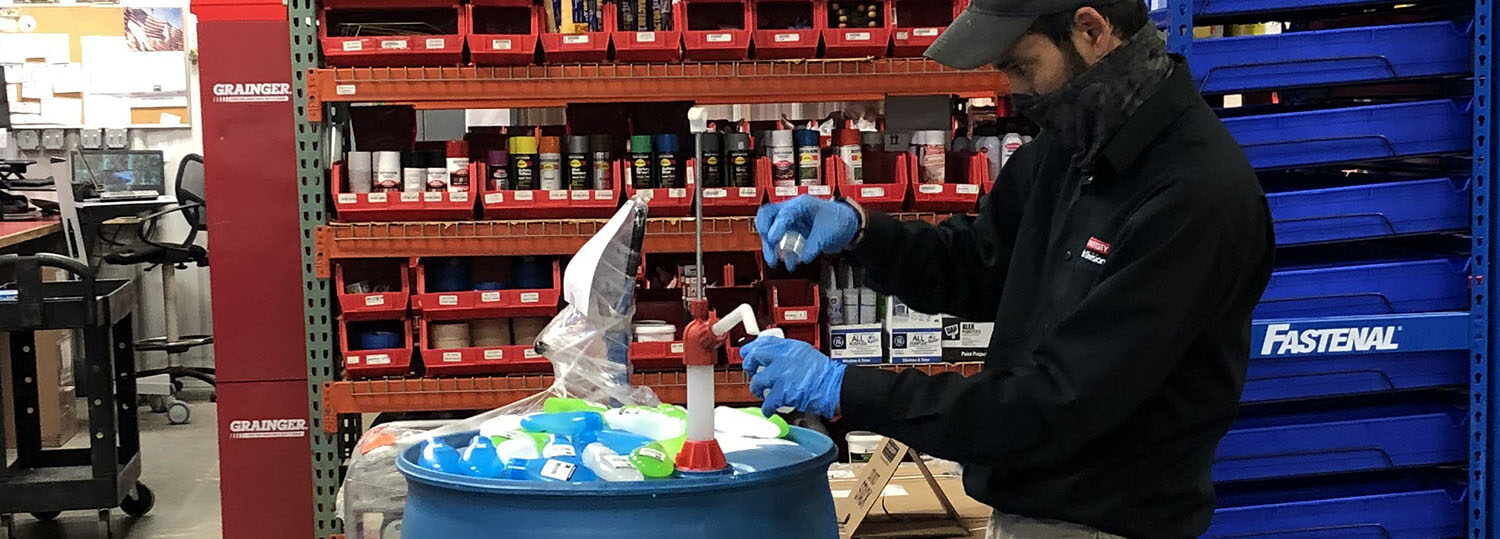Remember when it was next to impossible to find face masks, gloves and hand sanitizer at the store?
Employees with NC State University Facilities and Procurement and Business Services hustled to get supplies for campus when COVID-19 reached the United States. Despite shortages across the world, strong teamwork and collaboration ensured the Wolfpack had the necessities for safe classes, research and work.
On a typical day, Aaron Squaires orders repair supplies for the Facilities division’s warehouse. But in January, he and his Materials Management team started putting together a stash of emergency materials like filters in case they couldn’t order the supplies campus relies on.
“We tried to foresee what might be needed,” Squaires said. “All of a sudden, we couldn’t get gloves that our housekeepers and plumbers use. We couldn’t get the cloth towels the auto shop uses.”
“We imagined the worst-case scenario, like we do for hurricanes,” he added. “It ended up being worse than the worst-case scenario.”
Shortages lasted for months, but speed is crucial in combatting a pandemic. Squaires’ strategy was to buy materials as soon as possible, even if they were backordered. Sometimes, Squaires’ orders were canceled or redirected to hospitals. New cloth towels for the auto shop aren’t expected to arrive until December. Squaires spent hours upon hours researching product availability and logistics, but his team and other university units had his back. He received dozens of emails from coworkers, noting needed items available for purchase.
“The way it became a collaboration between everyone in Facilities really impressed me,” Squaires said. “I’m not sure how visible their work is to the outside eye, but we operated on a worst-case-scenario, be-ready-for-anything mindset for months.”
And Squaires has spent his time at NC State building solid relationships with vendors, proving the university’s trust and worth as a client.
“They know they can count on NC State, and because of that, they do their best for us,” Squaires said.
He even managed to buy two 55-gallon drums of hand sanitizer.
“We had to have the fire marshal take a look at it because we don’t normally store that much flammable liquid at a given time,” Squaires said. Those drums were used to refill smaller bottles of hand sanitizer, including personal-sized bottles for employees’ welcome kits.
The way it became a collaboration between everyone in Facilities really impressed me.
Sharon Loosman, director of Procurement and Business Services, helped organize the welcome kits, which included masks and wipes to clean computer screens. Her team’s biggest challenge was distributing all of the materials. Early on, multiple people from each college would request various supplies. It was a difficult distribution model to keep track of.
Loosman asked the assistant deans of finance for each college’s order, since they have a closer relationship with the students, faculty and staff. “They knew exactly what they needed,” she said.
The workers in Warehouse Services began distributing not only personal protective equipment to colleges but also mail to faculty, staff and students. Once in-person classes moved online and certain campus buildings closed, delivery services would take packages to the warehouse. They continued doing so even when students returned to campus in the fall. Employees in the Warehouse created a system to receive and deliver those packages, working with building liaisons and University Housing.
They didn’t lose a single package.
“When we come together like this and continue to support the business of education, it really makes a difference,” Loosman said.

